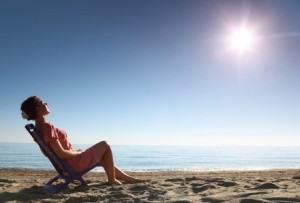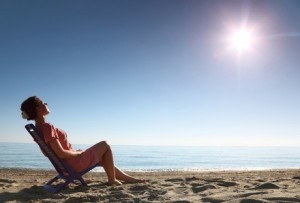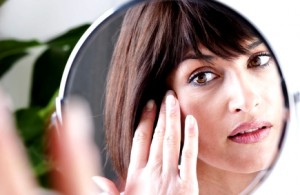
Cervical Cancer Screening for Most Women Can Be Less Frequent, Health Task Force Says
April 27, 2012
Fear the Needle? Replace Allergy Shots With Sublingual Immunotherapy
May 10, 2012Think ‘Prevention’ During Skin Cancer Awareness Month

 Skin cancer is the most commonly occurring type of cancer in the United States. About 20 percent of the American population will contract some form of skin cancer during their lifetimes. The victims include men and women of all ages and races.
Skin cancer is the most commonly occurring type of cancer in the United States. About 20 percent of the American population will contract some form of skin cancer during their lifetimes. The victims include men and women of all ages and races.
The good news about skin cancer is that it’s very treatable and better yet, highly preventable. Every May, the medical community tries to increase awareness of basic skin cancer prevention practices by declaring “Skin Cancer Awareness Month.”
Indeed, with the approach of the Memorial Day weekend at month’s end – the unofficial start of summer, to many people – May is the perfect time for people to re-acquaint themselves with the dangers posed by excessive exposure to the sun, and to resolve to limit their skin cancer risk throughout the summer season.
According to the Skin Cancer Foundation, the overwhelming majority of skin cancers are associated with exposure to the sun’s ultraviolet (UV) rays. Melanomas, the most dangerous kind of skin cancer, are related to solar UV exposure about 65 percent of the time. For non-melanoma skin cancer, the correlation is about 90 percent.
Some 800,000 Americans are living with a history of melanoma, according to the Skin Cancer Foundation. The University of Arizona Cancer Center (ACC) estimates that one person dies of melanoma every hour. Research by the ACC suggests that skin cancer rates in Arizona may be the highest in the nation, which is not a surprising statistic for a state where the sun shines brightly for most of the year.
Even if you never experience melanoma or one of the less dangerous forms or skin cancer, overexposure to the sun can cause a wide range of other problems that can affect the appearance of your skin. While the sun’s rays may temporarily give your skin an attractive, golden-brown glow, tanning will eventually cause your skin to appear older than it should for your chronological age. Although such “photoaging” can be countered to some extent by the modern science of medical aesthetics, it’s far easier to prevent the damage in the first place.
To protect and take care of your skin, follow these tips:
- Avoid tanning beds and tanning booths – Tanning appliance emit the same harmful UV radiation that the sun does.
- Stay in the shade when possible – What you’ve probably heard is true; the sun’s rays are especially strong between 10 am and 4 pm. The shorter your shadow is, the higher the sun is and thus the more intense its rays are. You’re safer when the length of your shadow exceeds your actual height.
- Stay covered – Short sleeves and short pants may seem cooler, but exposed arms and legs can burn within minutes under the right conditions. Wear long sleeves, long pants and a hat with a brim at least 3 inches wide.
- Use sunscreen – Apply it a half-hour before going out in the sun. Reapply it every two hours, or after swimming or heavy sweating. Use sunscreen that’s at least SPF 15, or SPF 30 for prolonged exposure.
- Get a skin examination – Check yourself monthly for new moles or suspicious changes to existing moles, and also have your Arizona primary care physician or a dermatologist perform a thorough skin examination annually.
When it comes to skin cancer or any other acute or chronic medical condition, naturopathic medicine emphasizes the importance of prevention and actively working to help your body’s own natural immunities keep it healthy and disease-free. Scottsdale naturopath Dr. Paul Stallone offers wellness care for the whole family at the Arizona Integrative Medical Center, in addition to treatment for ailments of all kinds, including complementary medicine treatments for cancer.
Call the friendly and helpful staff at the AIM Center today at ![]() (480) 21
(480) 21



